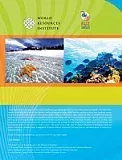 This working paper looks at the benefits that coastal ecosystems provide to the Dominican Republic. The studies highlight the contribution of coastal ecosystems to the economy and the need for greater investment in protecting coastal and marine ecosystems, including better management of marine fisheries, protection of existing reserves, and enforcement of coastal development guidelines.
This working paper looks at the benefits that coastal ecosystems provide to the Dominican Republic. The studies highlight the contribution of coastal ecosystems to the economy and the need for greater investment in protecting coastal and marine ecosystems, including better management of marine fisheries, protection of existing reserves, and enforcement of coastal development guidelines.
WRI working papers contain preliminary research, analysis, findings, and recommendations. They are circulated to stimulate timely discussion and critical feedback and to influence ongoing debate on emerging issues. Most working papers are eventually published in another form and their content may be revised.
This working paper is available in English and Spanish on the WRI web site: http://www.wri.org/publication/coastal-capital-dominican-republic
Executive Summary
Coastal and marine ecosystems provide many valuable services to the people and economy of the Dominican Republic. At first glance, these benefits can be difficult to see. Reefs and mangroves help to build beaches and slow erosion, draw local and international tourists to the coast, and provide habitat for valuable recreational commercial fish. Unfortunately, these services are often overlooked in key development and policy decisions. As a result, coastal ecosystems are threatened by unsustainable coastal development, pollution, overfishing, and other local and global pressures.
One of the key barriers to better decision-making is lack of information and understanding of the scope and value of benefits provided by these ecosystems. Little work has been done on this topic in the Dominican Republic, and data gaps make it difficult to assess the economic impact of ecosystem services provided by coral reefs at the national level.
The studies presented here look at a small sample of the benefits that coastal ecosystems provide to the Dominican Republic. These ecosystems (a) protect white sand beaches in vital tourism areas; (b) provide habitat for commercial fisheries; (c) provide the engine for potential tourism growth in a small marine protected area; and (d) generate local tourism dollars in the southwestern part of the country. The studies highlight the contribution of coastal ecosystems to the economy and the need for greater investment in protecting coastal and marine ecosystems, including better management of marine fisheries, protection of existing reserves, and enforcement of coastal development guidelines.